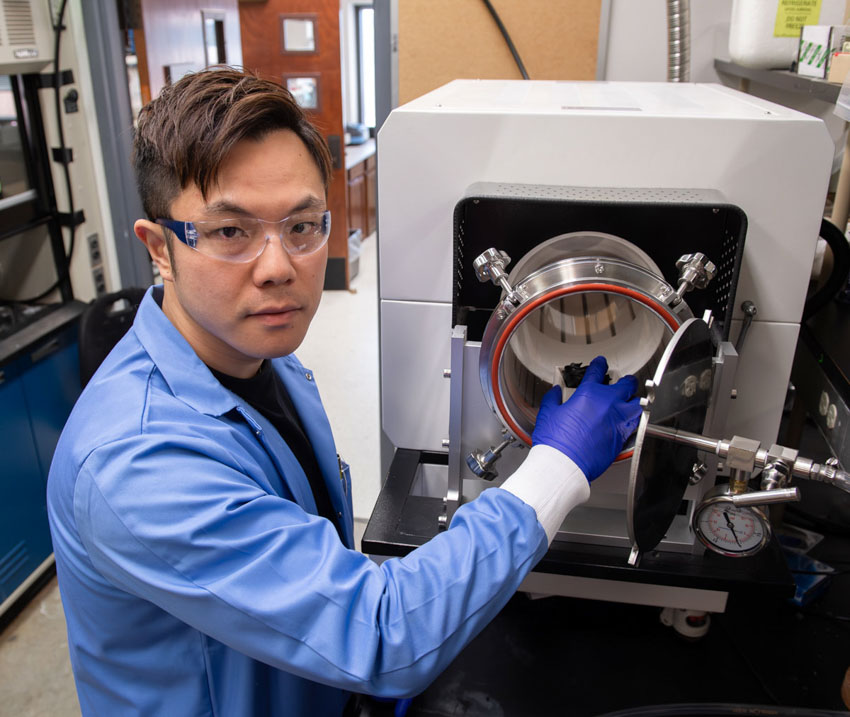USM Polymer Professor Awarded Funding as Scialog Fellow in Negative Emissions
Fri, 02/16/2024 - 01:15pm | By: Ivonne Kawas

Dr. Zhe Qiang, assistant professor in the School of Polymer Science and Engineering at The University of Southern Mississippi (USM), has been selected as a Scialog Fellow in Negative Emissions, organized by the Research Corporation for Science Advancement (RCSA), Alfred P. Sloan Foundation, and ClimateWorks Foundation.
Dr. Qiang is among 19 scientists on seven cross-disciplinary teams across the United States and Canada to receive $55K in funding by the Sloan Foundation.
The Scialog: Negative Emissions Science initiative brings together like-minded career scientists from various disciplines to explore and develop negative emissions technologies. This initiative focuses not only on the removal of carbon dioxide and other greenhouse gases from the atmosphere and oceans but also on considering options for both long-term storage and potential economic utilization of the captured carbon.
Dr. Qiang, along with his collaborative team, Dr. Marc Porosoff, assistant professor of chemical engineering at University of Rochester and Dr. Yuan Yao, assistant professor of industrial ecology and sustainable systems at Yale University, is working on developing a method for producing sustainable aviation fuel from biogas capture, which is a gaseous resource from raw materials, such as agricultural waste, to energy fuels.
The project titled “Modular Production of Aviation Fuel from Point Source Biogas Via Zoned Joule Heating,” aims to develop a low-cost and energy-efficient method for the production of aviation fuel, which is one of the most difficult-to-decarbonize sectors.
“I am honored to be a Scialog Fellow for negative emissions science. This initiative helps bring different research experts together, fostering interdisciplinary conversations and collaboration. Additionally, the financial support provided by the award offers our team the resources to further propel and advance our research,” said Dr. Qiang. “As we continue to work on developing a method for producing sustainable aviation fuel, our goal is to not only develop new technology but also fully understand its impact on environment development as well as commercial viability and potential.”
Dr. Qiang goes on to explain the broader implications of this research for addressing global greenhouse gas emissions.

“In manufacturing and chemical sectors, process heating is responsible for the largest energy consumption and greenhouse gas (GHG) emissions,” he said. “Our technology will be directly tackling this longstanding challenge, while broadly benefiting various application areas. If successful, we will have an innovative and transformative platform to change the future of the industry, simultaneously promoting environmental sustainability and economic diversity.”
Dr. Derek Patton, director of the School of Polymer Science and Engineering, commends Dr. Qiang for his recognition as a Scialog Fellow, emphasizing the achievement serves as a testament to the high caliber of expertise and commitment that characterizes USM’s research community.
“Seeing our faculty highlighted among the best and the brightest minds in the field, especially in tackling globally important issues such as decarbonization and reduction of GHG emissions, is truly inspiring,” said Dr. Patton. “Dr. Qiang's recognition as a Scialog Fellow in Negative Emissions underscores his exceptional creativity and commitment to innovation. Dr. Qiang's work exemplifies the interdisciplinary collaboration and forward-thinking research that are hallmarks of our university. We are immensely proud of his achievements and are excited to support his ongoing efforts to develop solutions that contribute to a more sustainable future."
Learn more about the School of Polymer Science and Engineering.
About Scialog
Scialog — short for “science + dialog” — was created in 2010 by RCSA to stimulate intensive interdisciplinary conversation and community building around a scientific theme of global importance. Negative Emissions Science, the Scialog initiative that is funding ML-ROCKS, is in its fourth and final year and aims to advance the underlying science needed to make technologies to capture and utilize greenhouse gases globally scalable.
About the Alfred P. Sloan Foundation
The Alfred P. Sloan Foundation is a not-for-profit, mission-driven grantmaking institution dedicated to improving the welfare of all through the advancement of scientific knowledge. Established in 1934 by Alfred Pritchard Sloan Jr., then-president and chief executive officer of the General Motors Corporation, the Foundation makes grants in four broad areas: direct support of research in science, technology, engineering, mathematics and economics; initiatives to increase the quality, equity, diversity and inclusiveness of scientific institutions and the science workforce; projects to develop or leverage technology to empower research; and efforts to enhance and deepen public engagement with science and scientists.